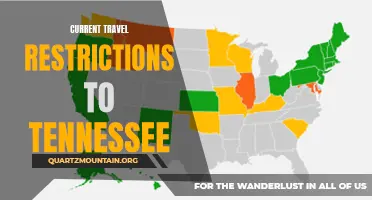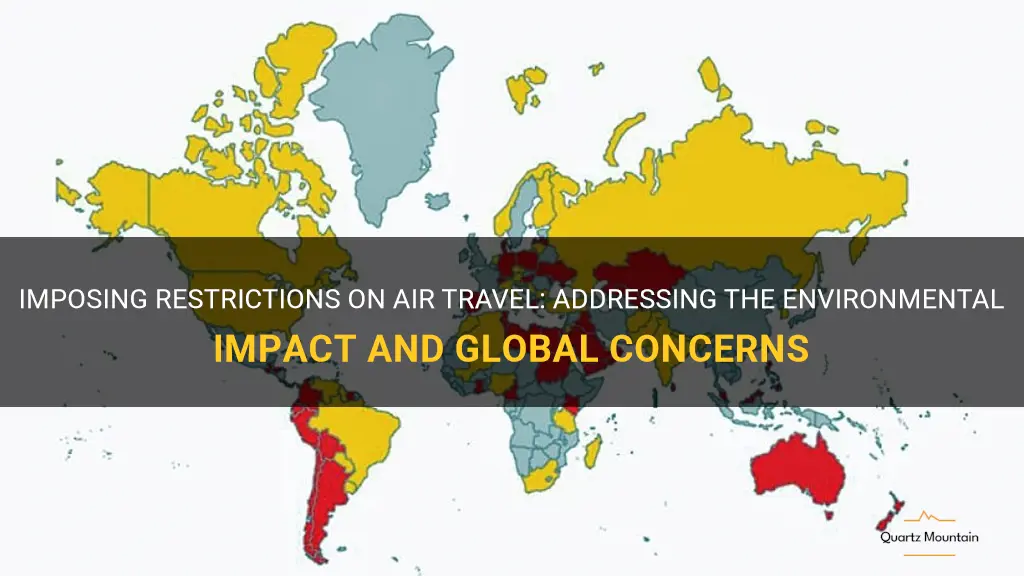
In today's interconnected world, air travel has become an integral part of our lives, connecting people, cultures, and economies like never before. However, as we face critical challenges such as climate change and global pandemics, the idea of restricting air travel has gained traction. While it may seem counterintuitive to limit our ability to soar through the skies, imposing restrictions on air travel could be a necessary step towards achieving sustainability and ensuring global health and well-being. Join me as we explore the complexities of this intriguing concept and dive into the potential benefits and consequences of restricting air travel.
What You'll Learn
- What are the main reasons for governments to restrict air travel?
- How has the COVID-19 pandemic impacted global air travel restrictions?
- What are the economic consequences of restricting air travel?
- How do countries coordinate their air travel restrictions with each other?
- Are there any alternatives to restricting air travel that could achieve similar objectives?

What are the main reasons for governments to restrict air travel?
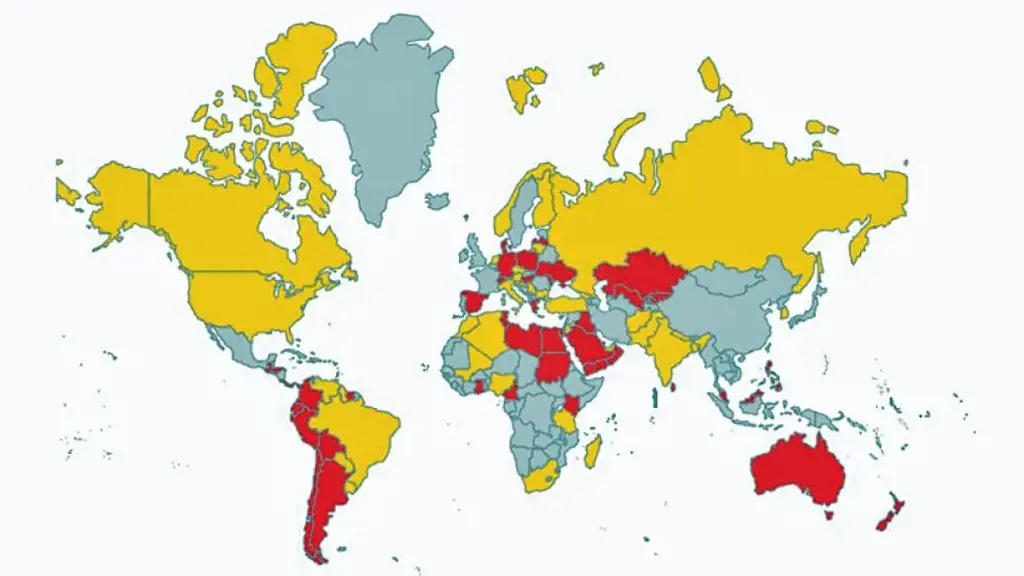
Air travel has become an essential mode of transportation for people around the world. It allows for faster and more convenient travel between cities and countries. However, there are instances where governments impose restrictions on air travel. These restrictions are put in place for a variety of reasons, all of which are aimed at ensuring the safety and security of passengers and the general public.
One of the main reasons for governments to restrict air travel is to prevent the spread of contagious diseases. The recent COVID-19 pandemic serves as a prime example of how governments have implemented strict measures to limit air travel in order to contain the virus. During the early stages of the pandemic, many countries implemented travel bans or imposed mandatory quarantine measures on incoming passengers. These restrictions were put in place to prevent the virus from spreading across borders and overwhelming healthcare systems.
Another reason for governments to restrict air travel is to maintain national security. Air travel can be a vulnerable target for terrorism and other threats. Governments often limit or impose stricter regulations on air travel in response to intelligence reports or specific threats. These restrictions can include enhanced security screenings, restricted airspace, or even temporary suspension of certain routes or flights.
Additionally, governments may restrict air travel to protect the environment and mitigate the impact of aviation on climate change. Air travel is a significant contributor to greenhouse gas emissions, which contribute to global warming. Governments may impose regulations such as carbon taxes or emissions trading schemes to encourage airlines to reduce their carbon footprint. In some cases, governments may also limit air travel to protect sensitive ecosystems or wildlife habitats, particularly in remote or environmentally fragile areas.
Furthermore, governments may restrict air travel for political reasons. This can include imposing travel bans or sanctions on certain countries or individuals as a means of diplomatic pressure or punishment. These restrictions may be imposed due to security concerns, human rights violations, or geopolitical conflicts.
In conclusion, there are multiple reasons why governments impose restrictions on air travel. These reasons vary from ensuring public safety and health, to maintaining national security, protecting the environment, and implementing political measures. It is important for governments to balance these restrictions with the needs and rights of individuals as they navigate the complex challenges of an interconnected world. Continued research and advancements in technology and policy are crucial to ensure the safe and sustainable future of air travel.
Navigating Heavy Haul Permit Restrictions for Weekend Travel
You may want to see also

How has the COVID-19 pandemic impacted global air travel restrictions?
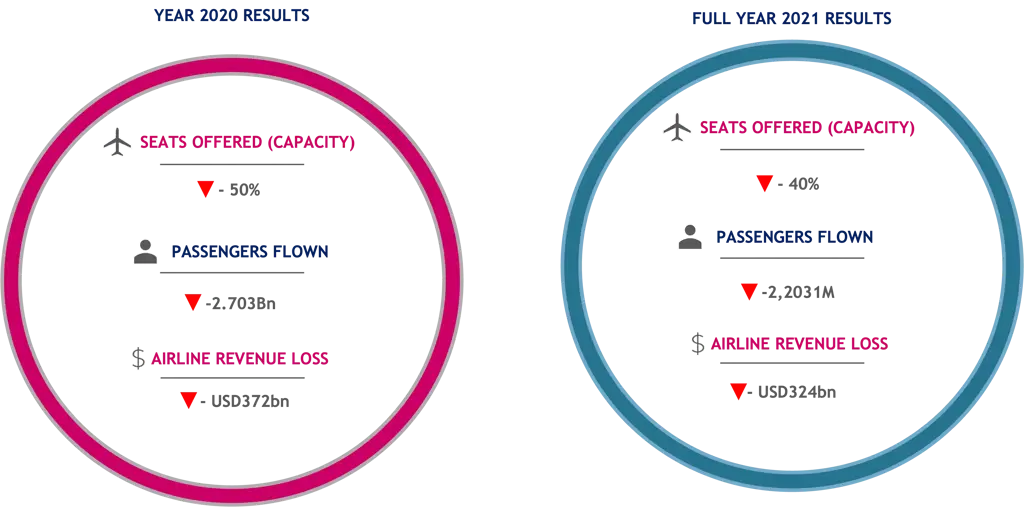
The COVID-19 pandemic has significantly impacted global air travel restrictions in numerous ways. Governments around the world have implemented various measures to control the spread of the virus, and these measures have had a profound effect on the aviation industry. In this article, we will explore how the pandemic has affected air travel restrictions and discuss the implications for travelers.
One of the most noticeable changes in air travel restrictions since the onset of the pandemic has been the implementation of travel bans and entry restrictions. Many countries have closed their borders to foreign tourists and implemented mandatory quarantine requirements for arriving passengers. For example, Australia has closed its borders to all non-citizens and non-residents, and those who are allowed to enter the country are subject to a 14-day quarantine period. These restrictions have effectively limited the number of people traveling internationally and have had a significant impact on the tourism industry.
In addition to travel bans and quarantine requirements, many countries have also introduced new health screening measures for travelers. This includes temperature checks, health questionnaires, and COVID-19 testing before departure or upon arrival. For example, in the United States, all international travelers are required to show proof of a negative COVID-19 test no more than 72 hours before their departure. These measures aim to identify and isolate infected individuals to prevent the spread of the virus across borders.
Furthermore, the COVID-19 pandemic has led to a significant reduction in flight availability and frequency. Many airlines have grounded a significant portion of their fleets as a result of decreased demand for air travel. This has resulted in fewer flights and limited options for travelers. In addition, many countries have imposed restrictions on the number of flights allowed to operate, leading to canceled flights and rescheduled itineraries. For example, several countries have implemented flight caps, including the United Kingdom and Singapore, which have limited the number of passenger flights that airlines can operate.
The travel restrictions imposed due to the pandemic have had a profound impact on the aviation industry and travelers alike. In addition to the inconvenience caused by canceled flights and limited travel options, the restrictions have also had economic implications. Airlines have suffered significant financial losses as a result of decreased passenger numbers and increased operational costs associated with implementing new health and safety measures. This has led to job losses and reduced services for travelers.
In conclusion, the COVID-19 pandemic has resulted in significant changes to global air travel restrictions. Governments around the world have implemented travel bans, entry restrictions, and health screening measures to control the spread of the virus. These restrictions, combined with reduced flight availability, have had a profound impact on the aviation industry and travelers. As the pandemic continues to evolve, it is crucial for travelers to stay updated on the latest travel restrictions and health guidelines to ensure safe and smooth travel.
Understanding the Epic Pass Travel Restrictions: What You Need to Know
You may want to see also

What are the economic consequences of restricting air travel?
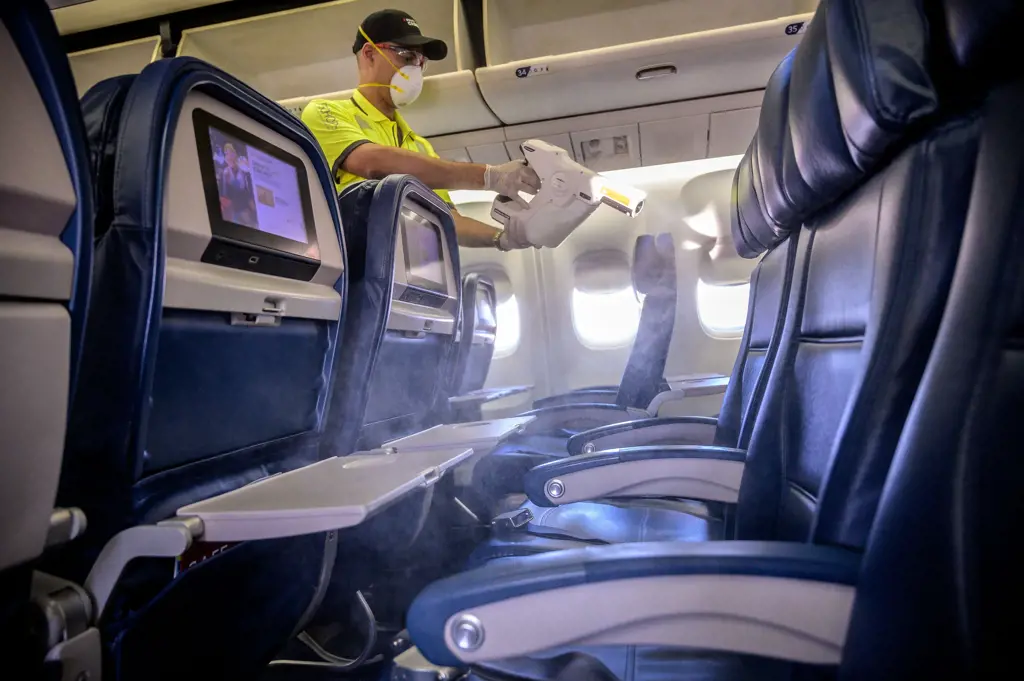
Air travel plays a crucial role in the global economy, connecting people, goods, and ideas across vast distances. However, there are times when restrictions on air travel must be implemented for various reasons such as security threats, natural disasters, or in the case of a global pandemic like the COVID-19 outbreak. These restrictions can have significant economic consequences that ripple throughout various industries and sectors.
One of the most immediate effects of restricting air travel is the impact on the airline industry itself. Airlines heavily rely on passenger revenues, and when travel is restricted, their profits plummet. This can result in job losses, reduced investment in infrastructure and technology, and even bankruptcies. In order to weather these downturns, airlines may need to cut costs by reducing staff, reducing flights, or decommissioning aircraft, further exacerbating the economic consequences.
Restricting air travel also affects the tourism industry, which relies heavily on international visitors. With limited access to air travel, the number of tourists decreases significantly, leading to a decline in revenue for hotels, restaurants, tour operators, and other tourism-related businesses. Many economies heavily depend on tourism as a major source of income and employment, so the consequences can be dire. Small businesses that rely on tourism may be forced to close, leading to job losses and a decrease in economic activity in the affected regions.
Furthermore, restricting air travel can disrupt global supply chains. Many businesses rely on the efficient and timely delivery of goods by air freight. When travel restrictions are in place, it becomes more challenging to transport goods across borders, leading to delays, increased costs, and disruptions in the production and distribution of goods. This can result in supply shortages, price increases, and reduced economic output in industries that rely on global trade.
The consequences of restricting air travel also extend to the wider economy. Travel restrictions can reduce foreign direct investment as companies may be deterred from investing in regions with limited accessibility. Additionally, conferences, events, and business meetings that rely on international participants may be canceled or postponed, affecting the hotel and hospitality industry, as well as local businesses that benefit from these events.
During the COVID-19 pandemic, many countries implemented strict travel restrictions to control the spread of the virus. The economic consequences of these restrictions were felt worldwide, with airline revenues falling by billions of dollars, tourism-dependent economies struggling to stay afloat, and global supply chains experiencing disruptions.
In summary, restricting air travel has far-reaching economic consequences. It affects not only the airline industry but also tourism, global supply chains, foreign investment, and various other sectors. The extent of these consequences depends on the duration and severity of the restrictions. Governments and industries must carefully consider the economic impact when deciding to restrict air travel and implement measures to mitigate the negative effects and support affected industries and workers.
Understanding the Current Travel Restrictions from the UK to the USA
You may want to see also

How do countries coordinate their air travel restrictions with each other?
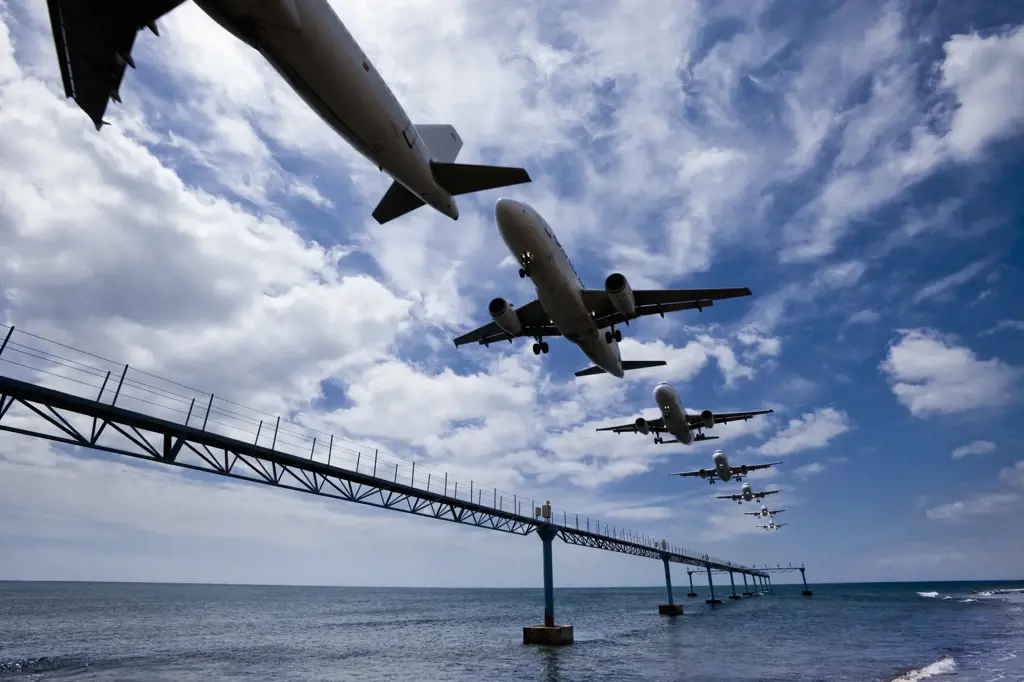
During times of crisis or when there is a need to control the spread of infectious diseases, countries often implement air travel restrictions. These restrictions can vary from screening passengers for symptoms to temporary bans on travel from certain countries. However, coordinating these restrictions with other countries is crucial to ensure effective control measures and to minimize the disruptions to global air travel. In this article, we will explore how countries coordinate their air travel restrictions with each other.
International Health Regulations (IHR):
The World Health Organization (WHO) developed the International Health Regulations (IHR) to help countries prevent and respond to public health threats that have the potential to cross borders. The IHR provides a framework for countries to coordinate their efforts in managing health risks, including air travel restrictions. Under the IHR, countries are required to notify the WHO about certain public health events, including those that may require travel restrictions. This allows the WHO to coordinate and share information among countries to ensure a harmonized response.
Bilateral and Multilateral Agreements:
Countries often establish bilateral or multilateral agreements to coordinate their air travel restrictions. These agreements can include provisions for sharing information, coordinating entry and exit screening procedures, and facilitating the movement of critical personnel and supplies. For example, during the COVID-19 pandemic, many countries established air corridors allowing for repatriation flights and the transport of essential goods.
International Organizations:
International organizations, such as the International Civil Aviation Organization (ICAO), play a vital role in coordinating air travel restrictions. The ICAO works closely with member states to develop and implement global aviation standards and recommended practices. These standards include measures to prevent the spread of infectious diseases through air travel. The ICAO also facilitates the sharing of information and best practices among member states to ensure a coordinated and effective response.
Data Sharing and Collaboration:
Effective coordination of air travel restrictions requires timely and accurate information about the epidemiological situation in different countries. To facilitate this, countries often share data about the number of cases, transmission patterns, and clinical surveillance. This information allows countries to make informed decisions about implementing travel restrictions and to coordinate their efforts with other countries. International organizations, such as the WHO, facilitate the collection and sharing of this data to help countries coordinate their response.
Regular Communication and Updates:
Regular communication between countries is essential to coordinate air travel restrictions effectively. This includes sharing information about new cases, changes in travel restrictions, and updates on the epidemiological situation. International organizations, such as the WHO and ICAO, provide platforms for member states to exchange information and to facilitate communication. Regular updates and clear guidelines help countries align their efforts and ensure a coordinated response.
In conclusion, coordinating air travel restrictions between countries is crucial to effectively manage public health risks and minimize the disruptions to global air travel. International frameworks, bilateral and multilateral agreements, international organizations, data sharing, and regular communication are all essential components of this coordination. By working together, countries can ensure a harmonized approach to air travel restrictions and protect public health worldwide.
Travel Restrictions from Connecticut to Maine: What You Need to Know
You may want to see also

Are there any alternatives to restricting air travel that could achieve similar objectives?
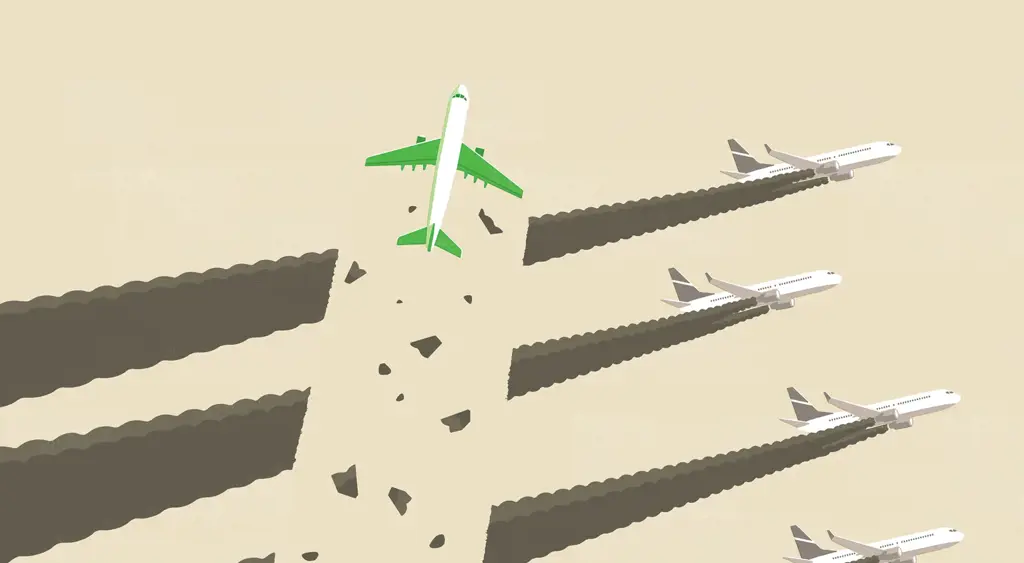
Air travel has become a major contributor to greenhouse gas emissions and is seen as a significant factor in climate change. As concerns about the environment grow, many people advocate for restricting air travel to combat this issue. However, there are also alternative strategies that can achieve similar objectives without completely limiting air travel.
One alternative is to increase the use of sustainable aviation fuels (SAFs). SAFs are fuels made from renewable sources, such as plant-based materials, that have a lower carbon footprint than traditional aviation fuel. By encouraging the development and adoption of SAFs, we can significantly reduce the carbon emissions associated with air travel. In fact, according to a study by the International Air Transport Association (IATA), SAFs have the potential to reduce aviation emissions by up to 80% compared to traditional fuel.
Another alternative is to improve aircraft efficiency. By investing in research and development, we can design and build more fuel-efficient aircraft that consume less fuel per passenger. This can be achieved through advancements in aerodynamics, engine technology, and lightweight materials. For example, the Boeing 787 Dreamliner was built using composite materials, which made it lighter and more fuel-efficient compared to previous models. Improving aircraft efficiency not only reduces emissions but also decreases operating costs for airlines.
Additionally, encouraging the use of alternative modes of transportation, such as high-speed trains, can help reduce the reliance on air travel for short-distance trips. High-speed trains are known to have lower emissions than airplanes and can offer a viable alternative for journeys within a certain distance. For instance, in Europe, the Eurostar train service connects cities like London, Paris, and Brussels, offering a fast and environmentally-friendly option for travel between these destinations.
Furthermore, advancements in telecommunication and video conferencing technology can also reduce the need for air travel. With the availability of high-quality video conferencing tools, businesses can conduct meetings and conferences remotely, eliminating the need for executives to fly to different locations. This not only reduces carbon emissions but also saves time and money for companies.
In conclusion, while restricting air travel is one way to address the environmental impact of the aviation industry, there are alternative strategies that can achieve similar objectives. By promoting the use of sustainable aviation fuels, improving aircraft efficiency, utilizing alternative modes of transportation, and leveraging telecommunication technologies, we can reduce emissions without completely eliminating air travel. It is crucial to explore and implement a combination of these solutions to mitigate the environmental impact of air travel while still maintaining connectivity and economic growth.
Navigating International Air Travel Food Restrictions: What You Need to Know
You may want to see also
Frequently asked questions
Yes, air travel can be restricted during a pandemic. Governments and health organizations may implement travel restrictions in order to prevent the spread of infectious diseases. These restrictions can include limiting or banning certain types of travel, such as non-essential or leisure travel, and imposing screening measures or quarantine requirements for travelers.
Restricting air travel during a pandemic is important because it helps to reduce the transmission of a disease across borders. Airports and airplanes can be hubs for the spread of infectious diseases due to the close proximity and high volume of people traveling. By restricting air travel, countries can aim to contain the spread of a disease within their borders and limit the importation of new cases from affected regions.
Governments can enforce air travel restrictions by implementing various measures. These can include temporarily closing airports or limiting the number of flights allowed to operate, imposing travel bans or restrictions on specific countries or regions, and implementing screening procedures such as health checks, temperature screenings, or mandatory testing for travelers. Governments may also work with airlines and travel agencies to ensure compliance with the restrictions.
Restricting air travel can have significant economic impacts, as the aviation industry plays a crucial role in global trade and tourism. Many businesses that rely on air travel, such as airlines, airports, and hotels, may experience financial losses. In addition, countries heavily dependent on tourism may see a decline in visitors, leading to job losses and reduced economic activity. However, governments may implement measures to mitigate these impacts, such as financial assistance for affected sectors or promoting domestic tourism.
The duration of air travel restrictions during a pandemic can vary depending on the severity and duration of the outbreak. Restrictions can be implemented on a temporary basis, with the aim of slowing down or containing the spread of the disease. The lifting of restrictions is usually based on factors such as decreasing case numbers, improved control measures, and the advice of health experts. Restrictions may be gradually eased or lifted entirely once the situation improves, although this timeline can vary from weeks to months.






